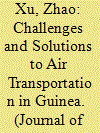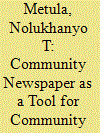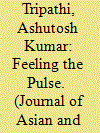|
|
|
Sort Order |
|
|
|
Items / Page
|
|
|
|
|
|
|
| Srl | Item |
| 1 |
ID:
168236


|
|
|
|
|
| Summary/Abstract |
After the dissolution of the first national airline in 2002, the Guinean government attempted to set up Guinea Airlines, but it was unsuccessful. This study aims to analyze the current state of air transport in Guinea and to conduct a diagnostic analysis for the revival of the national airline. The objective is to explore the causes of the failures of various attempts to revive the national company. The findings show that air transport has a positive spillover externality to economic long-run growth and the revival of Guinea Airlines could be a major asset to boost the country’s economic growth.
|
|
|
|
|
|
|
|
|
|
|
|
|
|
|
|
| 2 |
ID:
168232


|
|
|
|
|
| Summary/Abstract |
This paper delves into the rise and decline of Lagos’ China Town and its role as a locus of interactions between Chinese migrants and the Nigerian state. I argue that the rise and fall of Chinese private investment in Lagos’ China Town is explained by the Nigerian state’s adjustment to its own entry into the global market. While some Nigerian government officials formed a shared interest of community with Chinese traders via allowing smuggling and grey customs clearance, others frequently raided China Town in the name of protecting local industries. I also argue that Nigerian traders’ and consumers’ perspectives on substandard made-in-China products differed sharply from those of the Nigerian state and manufacturers.
|
|
|
|
|
|
|
|
|
|
|
|
|
|
|
|
| 3 |
ID:
168240


|
|
|
|
|
| Summary/Abstract |
This paper evaluates readers’ perceptions of Idikelethu newspaper as a tool for community development, particularly in Alice, in the Eastern Cape Province of South Africa. Data was collected from two focus group discussions that were held in the areas where Idikelethu newspaper has high readership rates. The findings revealed that development-related issues such as health awareness, education and community safety, among others, are regularly addressed by this community newspaper. Based on the findings and analysis of data, this study concludes that Idikelethu newspaper contributes in many ways to the development of its readers and Alice community in general. It is anticipated that the findings of this paper will play an important role in assisting Idikelethu and other community newspapers to function better as agents of community development.
|
|
|
|
|
|
|
|
|
|
|
|
|
|
|
|
| 4 |
ID:
168234


|
|
|
|
|
| Summary/Abstract |
Local religions, Islam and Christianity influence and shape West African livelihoods where for many spirituality is an integral part of work, time and making a living. For farmers the spiritual imbues their understanding of the natural world, as well as affecting the control and allocation of resources and their timely use. For the Sufist Mouride brotherhood of Senegal their work ethic nurtures agriculture and supports a diaspora of petty traders and businesses. Meanwhile, the Christian Pentecostal Church encourages myriad small businesses, and its promotion of a work ethic that has occasioned the contention of a Weberian-style transformation. The creation of sustainable networks of socio-economic change through religious adherence is not in doubt, but whether this will promote a general developmental shift is more contentious. Pentecostals emphasize education and literacy, a priority for most governments, but without job opportunities there is widespread discontent among the young, even the educated. Furthermore, the young are disenchanted by patrimonial-clientelist societies, and it is through religion that violent dissent is articulated. Assertions that religion per se is inimical to social and economic change in West Africa are difficult to substantiate. What is a problem for farmers and small businesses is the uncertainty not just of their immediate environments, but of the volatility and dysfunctional nature of the state, and a lack of enabling conditions. Thus, religion and spirituality provide help in difficult times for people, but also opportunities for improvement in their livelihoods and lifestyles.
|
|
|
|
|
|
|
|
|
|
|
|
|
|
|
|
| 5 |
ID:
168238


|
|
|
|
|
| Summary/Abstract |
Rising price of pulses is a matter of great concern for nutrition in India, which is home to the largest number of malnourished people in the world. The paper outlines policy strategies that can help in increasing the production of pulses and thereby making it available at affordable prices. The paper looks into neglect of pulses in agriculture policies that hampers farmers’ incentives to promote investment, technology and productivity. The analysis suggests for better incentives to farmers growing pulses in the form of higher minimum support prices, reflecting the true economic benefit of growing pulses coupled with a strong procurement network across the country. An action on technological front with focus on increasing yield levels thereby, reducing cost of production can be a game changer in pulse production.
|
|
|
|
|
|
|
|
|
|
|
|
|
|
|
|
| 6 |
ID:
168237


|
|
|
|
|
| Summary/Abstract |
This paper attempts to connect questions of gender construction and gender-based discrimination in terms of access to “…. Resources…. especially knowledge, power, position and culture…. and contribute….” to gender sensitive ethnographic studies; to examine occupational, structural and power inequalities within the tribal village setting of Boddaputtu and Borrapallam. It focuses on the economic conditions, the determinants by which labor is divided, and how these two systems “intertwine,” all of which influence how aspects of gender are constructed and reinforced. The paper highlights that there is division of labor that prescribes certain economic activities to males and certain activities to females.
|
|
|
|
|
|
|
|
|
|
|
|
|
|
|
|
| 7 |
ID:
168239


|
|
|
|
|
| Summary/Abstract |
After the democratisation of South Korea in 1987, political discourse on ‘big government’ nearly disappeared, largely because it recalled past authoritarianism. Authoritarian states are highly likely to employ ‘big government’ – exerting policy influence over the distribution of private resources – to sustain their political power, and Korea’s authoritarian state was no exception. Thus, newly inaugurated President Moon Jae-in’s official implication that he would pursue big government is notable, because he claimed to represent pro-democracy groups that opposed both historical authoritarianism and the former president’s undemocratic governance. In this context, this study examines external and internal political-economic factors behind the revival of big government discourse in Korea. Results show that critical factors included the lack of pressure in the global capitalist market and the dominance of governmentalists over marketists in the political-economic discourse influencing the administration’s maintenance and expansion of its political foundation.
|
|
|
|
|
|
|
|
|
|
|
|
|
|
|
|
| 8 |
ID:
168233


|
|
|
|
|
| Summary/Abstract |
Meal frequency is an important indicator of food security and nutritional status. Defining food insecurity as a household’s inability to consume at least three meals a day, this study uses a logit model to investigate the socioeconomic determinants of food insecurity among Zambian households. Primary data from the 2010 Living Conditions Monitoring Survey data set developed by the Central Statistical Office were used. The 2010 Living Conditions Monitoring Survey used a nationally representative sample of about 20,000 households. This study found that urban households, households with higher income, and households with younger, more educated and male heads were more likely to be food-secure. Therefore, there is need to accelerate investments in formal education, narrow the rural–urban socioeconomic divide, and reduce gender inequities through deliberate policies to increase women’s access to and control over economic resources such as land.
|
|
|
|
|
|
|
|
|
|
|
|
|
|
|
|
| 9 |
ID:
168235


|
|
|
|
|
| Summary/Abstract |
In this article, Britain’s attitude towards Nigerians’ voluntary enlistment as combatants during the Second World War is studied. The historical method is deployed to interrogate previously untapped archival sources on the subject. Against the conventional wisdom, this micro-study posits Britain’s rebuff of Nigerians’ voluntary enlistment in order to preserve white supremacy by not arming and deploying Africans to fight Europeans. Nigerians protested the British treatment of the war as a white man’s war in which Africans had no significant role to play. Pressure on British manpower necessitated a policy reversal. Conscription was, thus, not due to Africans’ refusal to fight for Britain.
|
|
|
|
|
|
|
|
|
|
|
|
|
|
|
|
|
|
|
|
|